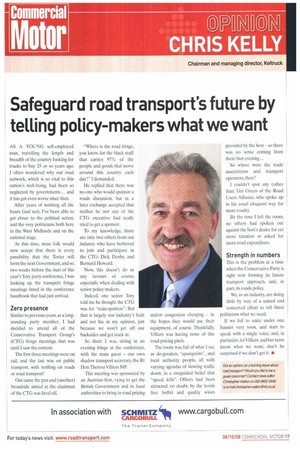Safeguard road transport's future by telling policy-makers what we want
Page 17

If you've noticed an error in this article please click here to report it so we can fix it.
AS A YOUNG self-employed man, travelling the length and breadth of the country looking for trucks to buy 25 or so years ago, I often wondered why our road network, which is so vital to this nation's well-being, had been so neglected by governments... and it has got even worse since then.
After years of working all the hours God sent, I've been able to get closer to the political action, and the very politicians, both here in the West Midlands and on the national stage.
At this time, most folk would now accept that there is every possibility that the Tories will form the next Government, and so, two weeks before the start of this year's Tory party conference, I was looking up the transport fringe meetings listed in the conference handbook that had just arrived.
Zero presence
Similar to previous years, as a longstanding party member, I had decided to attend all of the Conservative Transport Group's (CTG) fringe meetings, that was until I saw the content.
The first three meetings were on rail, and the last was on public transport, with nothing on roads or road transport!
Out came the pen and (another) broadside aimed at the chairman of the CTG was fired off. "Where is the road fringe, you know, for the black stuff that carries 97% of the people and goods that move around this country each day?" I demanded.
He replied that there was no-one who would sponsor a roads discussion, but in a later exchange accepted that neither he nor any of the CTG executive had really tried to get a sponsor.
To my knowledge, there are only two others from our industry who have bothered to join and participate in the CTG: Dick Denby, and Bernard Howard.
Now, this doesn't do us any favours of course, especially when dealing with senior policy-makers.
Indeed, one senior Tory told me he thought the CTG was for "train-spotters". But that is largely our industry's fault and not his, in my opinion, just because we won't get off our backsides and get stuck in.
So there I was, sitting in an evening fringe at the conference, with the main guest — our own shadow transport secretary, the Rt Hon Theresa Villiers MP.
This meeting was sponsored by an Austrian firm, vying to get the British Government and its local authorities to bring in road pricing and/or congestion charging — in the hopes they would use their equipment, of course. Thankfully Villiers was having none of this road-pricing pitch.
The room was full of what I see as do-gooders, "quangoists", and local authority people, all with varying agendas of slowing traffic down, in a misguided belief that "speed kills". Others had been attracted, no doubt, by the lavish free buffet and quality wines provided by the host — so there was no sense coming from them that evening...
So where were the trade associations and transport operators, then?
I couldn't spot any (other than Tim Green of the Road Users Alliance, who spoke up in his usual eloquent way for more roads).
By the time I left the room, no others had spoken out against the host's desire for yet more taxation or asked for more road expenditure.
Strength in numbers
This is the problem at a time when the Conservative Party is right now forming its future transport approach, and, in part, its roads policy.
We, as an industry', are doing little by way of a united and concerted effort to tell these politicians what we need.
If we fail to unite under one banner very soon, and start to speak with a single voice, and, in particular, let Villiers and her team know what we want, don't be surprised if we don't get it. •




































































































































































